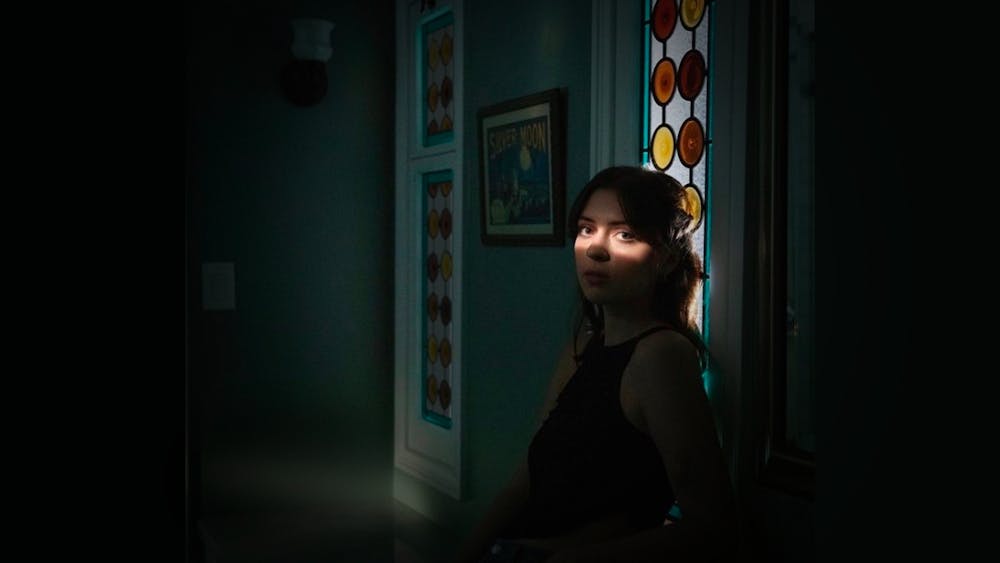Lizzy McAlpine has been bubbling in the indie–pop scene for the last few years. Named as an “up–and–coming vocalist” by the BBC, McAlpine found increasing success following her previous album, Give Me A Minute, which has nearly 100 million streams. The Philly native made her late–night television debut on Jimmy Kimmel Live! last year and is also a rising TikTok star, with her biggest video—featuring an unreleased song—reaching nearly 2 million likes. But on her third studio album, five seconds flat, McAlpine brings folk–pop and storytelling to the forefront, allowing her to show off her potential to top 40–radio crossover.
At its core, five seconds flat is about recovering from heartbreak and longing. Fundamentally, this doesn’t sound too different from another well–known breakup album: Olivia Rodrigo’s SOUR. But while Rodrigo excelled at tugging the heartstrings of the general public and telling stories of doomed teenage love, McAlpine’s tales of romance have an extra touch of maturity to them.
Take “doomsday,” the album’s opener and first single, where McAlpine describes the imminent breakup as doomsday over folksy instrumentation and how she’d “like to start planning [her] funeral” before the power gets taken away from her. The lyrics are a tad melodramatic, but powerful nonetheless. She acknowledges that the relationship is doomed and calls her significant other a “narcissist” for controlling when the relationship can end, but McAlpine regains her power and control over her own life. The “death” of her relationship is her key to freedom, and she wants it on her own terms.
“called you again” shows a more remorseful side to McAlpine, where the singer acknowledges that she had part of the blame for the failure of a relationship. “And I should be the end of it / But I never know when to stop talking / So I make my bed and sleep in it alone,” sings the 22–year–old, and she reveals that anger wasn’t the only emotion she felt following the breakup. Curiously, the song’s contemplative lyrics are accompanied by an anthemic guitar backing, perhaps to demonstrate the false positivity she was feeling as she was reeling from the breakup when she really was feeling the opposite.
These songs show the storytelling aspect of her songwriting that’s been present since her previous album, but what makes this album extra interesting are the stylistic changes. Give Me A Minute felt homegrown, and songs like “Pancakes for Dinner” and “To the Mountains” had a DIY quality to them like Polaroid snapshots of two lovers. five seconds flat, then, would be a reversal of that pastel–like fever dream. The album feels like sour grapes aging to become well–rounded wine, maturing into a richer sound.
The collaborations McAlpine brings to the table best demonstrate this new course direction. In the climax of “reckless driving,” both McAlpine and featured artist Ben Kessler chant the cathartic final chorus. “I'm a careful driver,” sings McAlpine, and Kessler responds, “I'm a reckless driver." The call and response of this feuding pair continues in the song’s final moments. But as it approaches the end, it abruptly cuts off. A listener would be thrown off, wondering if their audio has been interrupted, or, perhaps, if the pair actually crashed into a tree. This type of listening experience is what McAlpine excels at the most, and she uses instrumentation as a tool to convey her message.
McAlpine also worked with FINNEAS on “hate to be lame,” a tender ballad about falling in love and being unsure of their feelings that was also performed at Coachella. Their doubts about revealing their feelings have a layer of self–deprecation and existentialism to them. “Maybe my mistakes are the reason / That I made it back to you in time / If I could rewind, would there be some butterfly effect?” sings FINNEAS, as if he were spiraling down the path of what–ifs and what–could–have–beens.
But the crown jewel in the album has to be “erase me,” which features Jacob Collier. Her most pop–leaning cut from the album, the song is also arguably the climax of her short film, five seconds flat, the film, where the audience sees McAlpine reaching rock bottom at the end of the relationship. The song itself is no more cheery, describing her experiences in the beds of strangers when she feels her ex–lover “fadin',” “wonder[ing] who will erase [her]?” The explosive second half of the song is synth–heavy and vocal forward, in part thanks to Collier’s vocal harmonies, and we can feel her desperation and her sense of feeling lost.
With big–name collaborations, increasing media presence, opening for Coldplay, and a nearly sold–out headlining tour, McAlpine is a name to look out for in the alternative and pop scenes. Her stylistic music captivates audiences, and as her career grows, we’ll no doubt see more facets of this blossoming indie artist.







